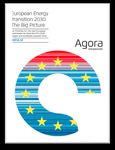Heat Decarbonisation: A crucial component of the Energy Transition - Lessons for EU s Smart Sector Integration Strategy to achieve the long-term ...
←
→
Page content transcription
If your browser does not render page correctly, please read the page content below
Heat Decarbonisation: A crucial component of the Energy Transition Lessons for EU´s Smart Sector Integration Strategy to achieve the long-term climate goals Alexandra Langenheld, Peter Mellwig, Dr. Jan Rosenow, Dr. Richard Lowes BERLIN, 30 APRIL 2020
Drivers and windows of opportunities for heat decarbonisation
Drivers:
2050 climate neutrality objective EU and Germany
European Grean Deal and Air pollution
Windows of opportunities:
Implementation of existing EU legislation, e.g. nearly zero energy
buildings (31st December 2020, EPBD)
NECPs (June 2020, evaluation by EC) and LTRSs
Renovation wave: timing to be maintained as key element of any post-
COVID recovery plan (non-legislative, Q3 2020/ autumn)
Smart Sector Integration Strategy (non-legislative, June 2020, could
be delayed to October) > Download
Heat Decarbonisation | 30 April 2020 | Alexandra Langenheld 2Outline
1. Introduction and setting the scene (Alexandra Langenheld)
Heating without the hot air: Principles for smart heat electrification (Jan Rosenow/
2.
Richard Lowes)
3. Poll: How do you expect the future role of PtX in the building sector?
Building sector Efficiency: A crucial Component of the Energy Transition (Peter
4.
Mellwig/ Alexandra Langenheld)
5. Questions and answers (all)
Heat Decarbonisation | 30 April 2020 | Alexandra Langenheld 3Poll: How do you expect the future role of PtX in the building sector? 1. Basic energy source in 2050 2. Essential part of energy supply 3. Minor part of energy supply 4. Only for single application 5. There will be no PtX in 2050
Building Efficiency is Key for the Achievement of long-term Climate
Goals
The future is either "all Technology neutrality PtX enables use of Today's incentives and
electric" or „all gas“. allows for less insulation. existing technologies and requirements for buildings
infrastructure. are sufficient.
Key findings at a glance
„Technology-either/ or“ Efficient buildings as PtX expected to be more "Roadmap Building
will not result in target entrance ticket for expensive and to retain Efficiency 2030“ required:
achievement: technological openness: import dependency:
Align incentives and
Pursuing all options with They preserve RES PtX a supplement in the requirements with targets;
determination and potential and flexibility; building sector, but no make best possible use of
planning, in order to without insulation, no substitute for insulation; refurbishment occasions;
move towards target meaningful use of RES- urgently required in other implement flanking
course. technologies. sectors. measures.Further publications by Agora Energiewende
15 Eckpunkte für Building sector European Energy The Future Cost of Heat Transition
das Efficiency: A crucial Transition 2030: Electricity-Based 2030
Klimaschutzgesetz Component of the The Big Picture Synthetic Fuels
Energy Transition
> Full study (DE) > full study (EN) > full study > full study > summary (EN)
> PtG/PtL calculator > full study (DE)
> slide deck (DE) > slide deck > slide deck > slide deck
> webinar
Heat Decarbonisation | 30 April 2020 | Alexandra Langenheld 8Agora Energiewende T +49 (0)30 700 1435 - 000 Please subscribe to our newsletter via Anna-Louisa-Karsch-Str. 2 F +49 (0)30 700 1435 - 129 www.agora-energiewende.de 10178 Berlin @ info@agora-energiewende.de www.twitter.com/AgoraEW Thank you for your attention! Questions or Comments? Feel free to contact us: alexandra.langenheld@agora-energiewende.de peter.mellwig@ifeu.de jrosenow@raponline.org r.lowes@exeter.ac.uk Agora Energiewende is a joint initiative of the Mercator Foundation and the European Climate Foundation.
You can also read



























































